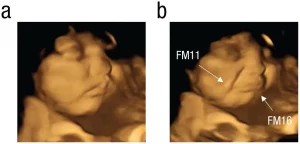 Babies in the womb react to the taste of food that their mother eats. Yes, it's true. A study conducted in England found that babies (the fetus) during 32 to 36 weeks development generally smiled or laughed after their mother ate carrots, but grimaced after she ate kale.
Babies in the womb react to the taste of food that their mother eats. Yes, it's true. A study conducted in England found that babies (the fetus) during 32 to 36 weeks development generally smiled or laughed after their mother ate carrots, but grimaced after she ate kale.
The fetus can smell and taste the food that the mother eats. Researchers of the study said that the diet of the pregnant woman exposes the baby to all sorts of flavors and smells, and say that "prenatal flavor exposure" has an effect on "chemosensory development".

Other studies had found that babies are more willing to eat foods that their mother had eaten during pregnancy, but this latest study actually had photographic evidence of the baby's responses. [The study has some good photos.] Some other earlier studies found that the amniotic fluid is flavored by the foods a mother eats during pregnancy.
Excerpts from Science Daily: Babies react to taste and smell in the womb
Scientists have recorded the first direct evidence that babies react differently to various smells and tastes while in the womb by looking at their facial expressions.
A study led by Durham University's Fetal and Neonatal Research Lab, UK, took 4D ultrasound scans of 100 pregnant women to see how their unborn babies responded after being exposed to flavors from foods eaten by their mothers.
Researchers looked at how the fetuses reacted to either carrot or kale flavors just a short time after the flavors had been ingested by the mothers.
Fetuses exposed to carrot showed more "laughter-face" responses while those exposed to kale showed more "cry-face" responses.
Their findings could further our understanding of the development of human taste and smell receptors. The researchers also believe that what pregnant women eat might influence babies' taste preferences after birth and potentially have implications for establishing healthy eating habits.
Humans experience flavour through a combination of taste and smell. In fetuses it is thought that this might happen through inhaling and swallowing the amniotic fluid in the womb.
Lead researcher Beyza Ustun, a postgraduate researcher in the Fetal and Neonatal Research Lab, Department of Psychology, Durham University, said: "A number of studies have suggested that babies can taste and smell in the womb, but they are based on post-birth outcomes while our study is the first to see these reactions prior to birth.
"As a result, we think that this repeated exposure to flavors before birth could help to establish food preferences post-birth, which could be important when thinking about messaging around healthy eating and the potential for avoiding 'food-fussiness' when weaning.
The research team, which also included scientists from Aston University, Birmingham, UK, and the National Centre for Scientific Research-University of Burgundy, France, scanned the mothers, aged 18 to 40, at both 32 weeks and 36 weeks of pregnancy to see fetal facial reactions to the kale and carrot flavours.
Mothers were given a single capsule containing approximately 400mg of carrot or 400mg kale powder around 20 minutes before each scan. They were asked not to consume any food or flavored drinks one hour before their scans.
The mothers also did not eat or drink anything containing carrot or kale on the day of their scans to control for factors that could affect fetal reactions.
Facial reactions seen in both flavor groups, compared with fetuses in a control group who were not exposed to either flavor, showed that exposure to just a small amount of carrot or kale flavor was enough to stimulate a reaction.
